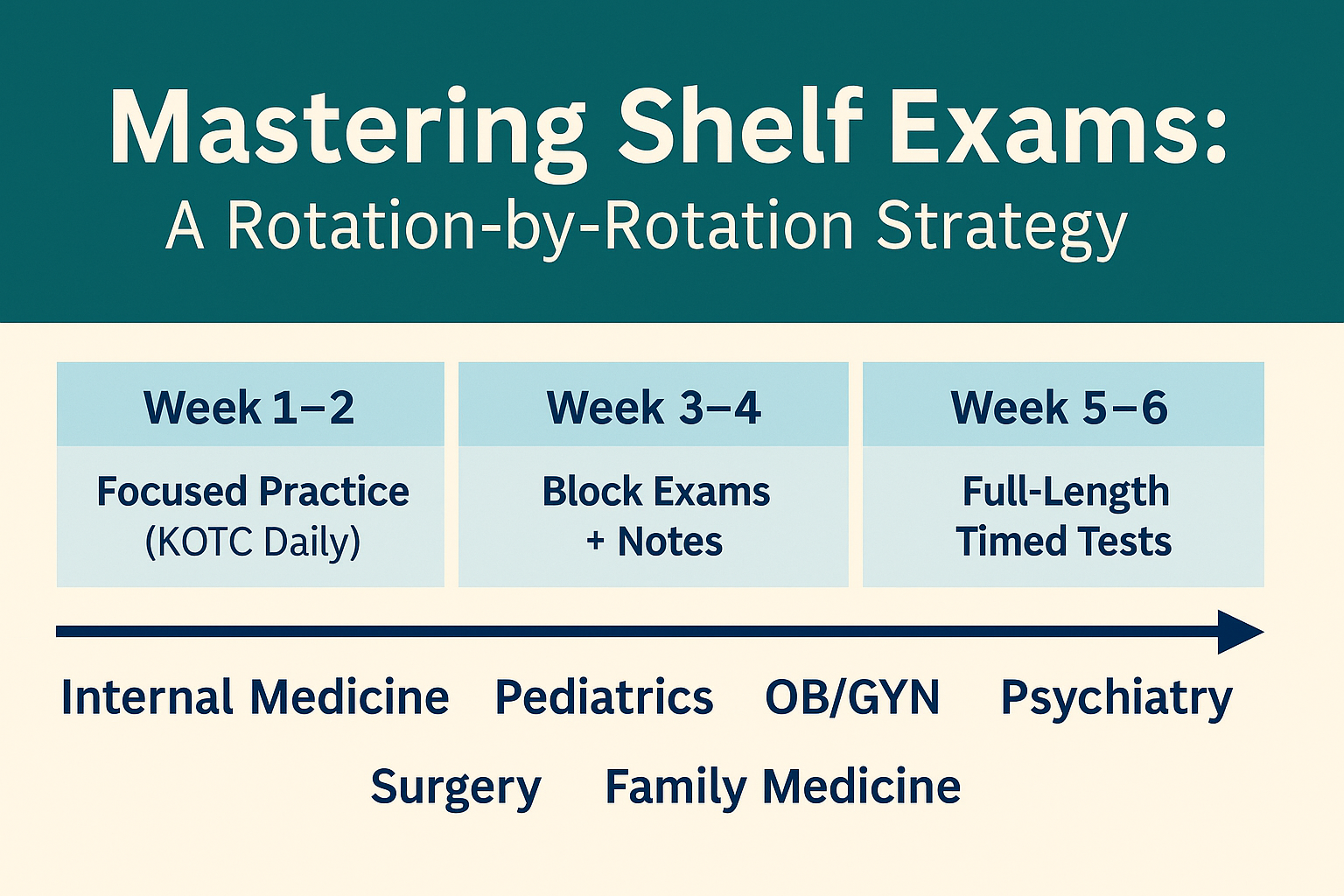🩺 Mastering Shelf Exams: A Rotation-by-Rotation Strategy
Shelf exams can feel like pop quizzes from hell. Each rotation hits you with a different topic, a different format, and a different curveball. But the truth is, shelf exams are more than just mini Step 2 CKs — they’re your chance to build clinical confidence and impress your attendings. Today, we’ll walk through how to crush your shelf exams by using targeted strategies for each core rotation and maximizing your time with KOTC tools.
📚 Top 5 Universal Shelf Exam Tips
| # | Strategy | Why It Works |
|---|---|---|
| 1 | Use Timed Mode Early | Simulate exam pressure right from week 1 using KOTC’s timed blocks. |
| 2 | Don’t Wait to Cram | Do 5–10 questions/day even during busy clinical shifts to stay fresh. |
| 3 | Make Mistake Notebooks | Build flashcards or handwritten notes from missed questions to reinforce learning. |
| 4 | Target NBME-Style Qs | Use KOTC’s Adaptive Q-Bank with clerkship filters for high-yield prep. |
| 5 | Weekend Reviews | Dedicate 2–3 hours to deep review or peer discussion to connect big picture concepts. |
📝 Rotation-by-Rotation Breakdown
Internal Medicine
High-yield systems: cardiology, nephrology, pulmonology, infectious disease
Tools: KOTC internal medicine packs + daily question streak
Resources: Step-Up to Medicine + Boards and Beyond videos
Pediatrics
Focus: development milestones, vaccinations, GI and respiratory cases
Use KOTC’s age-specific flashcards + pediatric diagnostic question sets
OB/GYN
Know: fetal heart monitoring, prenatal testing, labor management, contraception
Strategy: create an “algorithms-only” cheat sheet for review week
Surgery
Trickiest shelf — it’s more medicine than procedures
Master: post-op complications, fluid management, trauma protocol
KOTC pro tip: Use the “Surgical Rapid Fire” timed review set
Psychiatry
Focus: side effects of antipsychotics, DSM-5 criteria, safety assessments
Watch: Sketchy or KOTC’s visual guides to mood disorders
Family Medicine
Broadest scope = most variety
Do: 10–15 questions/day in final week using cross-specialty filters in KOTC
📊 Shelf Study Timeline by Rotation
| Weeks | Study Phase | Focus Area |
|---|---|---|
| Week 1–2 | Focused Practice | Use KOTC Daily Questions and flashcards tied to your current rotation topics. |
| Week 3–4 | Block Exams + Notes | Do mini full-length practice blocks (20–40 questions), take notes on explanations. |
| Week 5–6 | Full-Length Timed Tests | Use KOTC’s Timed Mode to simulate real exam pacing, review scoring and analytics. |
Before You Go…
Shelf exams aren’t just boxes to check — they’re mini-boards in disguise.
🚀 Call-to-Action (CTA)
Crush your shelves and Step 2 CK at once with King of the Curve’s shelf-smart prep platform.
👉 Get started free today
Frequently Asked Questions (FAQs)
-
Aim for 4-6 focused hours, ensuring you incorporate breaks to avoid burnout.
-
Practice mindfulness techniques, take practice exams under realistic conditions, and maintain a balanced lifestyle.
-
Set short-term goals, seek support from mentors, and reward yourself for small achievements.
-
Regular exercise improves focus, reduces stress, and enhances overall mental clarity.
-
KOTC offers personalized learning tools, gamification features, and adaptive question banks to help students stay on track without burnout.


